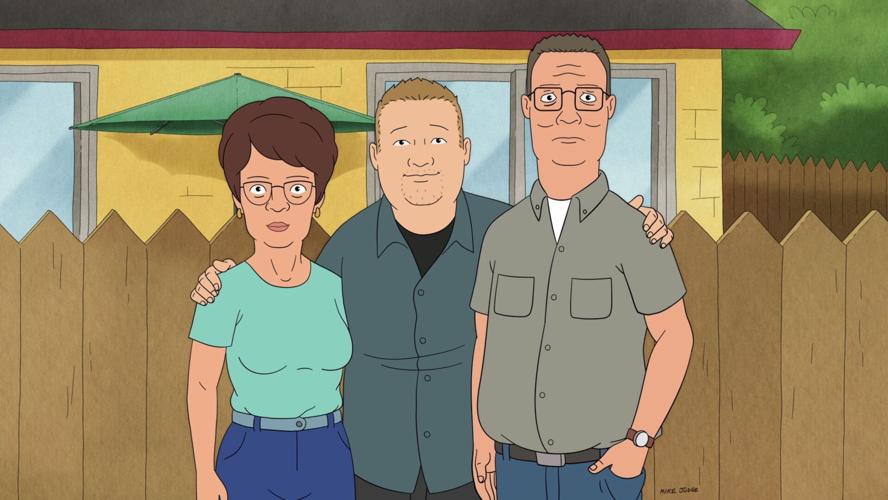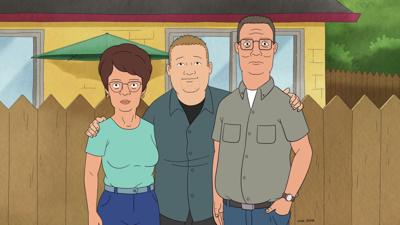Author and former Maclean’s writer and TV blogger Jaime Weinman is an authority on one of the best-remembered shows of the 1990s: The Fox animated comedy “King of the Hill.” Now that it’s back, he has taken a quick preview and shares his thoughts. Can the revived show live up to its past? Or have the times changed too much?
Would Hank Hill be MAGA? Can he exist in the Trump era without answering that? On Aug. 4, 2025, Hulu (and Disney Plus in Canada) will launch a revival of Mike Judge and Greg Daniels’ animated sitcom “King of the Hill.” Judge voices the protagonist, Hank Hill, an emotionally repressed propane salesman from suburban Texas, a proud Ronald Reagan voter, and a moderate conservative equally disdainful of hippies and conspiracy theorists.
Judge, Daniels and new showrunner Saladin K. Patterson (“Frasier”) made the unusual decision to begin the revival with a time skip: all the characters have aged since the original series ended in 2010, and Hank and his indomitably self-confident wife Peggy (voiced by Kathy Najimy) are returning to their hometown of Arlen after being out of the country for years. If things had gone differently in the real world, they might have missed the entire Trump administration: As things stand, the show is haunted by the question of what it means to be a moderate in an era when moderation is hard to define.
“Hank always represented the sensible middle,” “Well, Hank’s been gone, and while he’s gone, the country’s changed so much that where Hank stood in the middle isn’t really the middle anymore.”
The original “King of the Hill” first appeared on the Fox network in 1997, and as a creation of the relatively apolitical Bill Clinton era, it was analyzed more for its sympathetic portrayal of Texas than for any political significance. Today politics and pop-culture commentary are more intertwined, and the question of how characters would vote is more urgent than it used to be: Nick Offerman, who played a staunch libertarian character on the live-action sitcom “Parks & Recreation” (co-created by Daniels) recently of why his character would never have supported Trump.

Saladin K. Patterson, Greg Daniels, and Mike Judge attend a panel for “King of the Hill” during Comic-Con International on Friday, July 25, 2025, in San Diego.
Andrew Park Andrew Park/InvisionWith Hank, even his admiration of pre-Trump Republicans is controversial now: when Hulu released a preview clip showing Hank talking admiringly about George W. Bush, the internet lit up with comments that this was out of character, citing a 2000 episode where Hank was dismayed to find that then-Governor Bush had a limp handshake. In an older era, a character’s political views were just throwaway jokes; now it’s become important to believe that fictional characters are on our side politically.
One reason fans want Hank to be on their side is that Judge, Daniels and their colleagues created a genuinely beloved character whose appeal crossed all cultural boundaries. Hank was gently mocked by the writers for his obsession with propane and his utter terror at open displays of affection, but he was also a centrist hero for a centrist era. Daniels, the original showrunner (later known for developing the U.S. version of “The Office”) by Philip K. Howard, and Hank was the ultimate common-sense guy who came around to accepting social change, treated all people with respect, but always won against bureaucrats, religious fundamentalists, and other objects of middle-of-the-road scorn.
With its big-tent appeal, “King of the Hill” became the first prime-time animated sitcom since “The Simpsons” to become a long-running hit, and it has had a strong afterlife in repeats on outlets like Hulu and Adult Swim. Despite never having been to Texas, it was my single favourite U.S. show for much of its run, I celebrated it in , and I consider the third season, with episodes that found unlikely and moving comedy in subjects like death and mental illness, the best of any animated sitcom. And since it had a much shorter run than “The Simpsons” or “Family Guy,” being cancelled with “only” 259 episodes, it never had to face the accusations of becoming a “zombie” franchise; most fans find it at least watchable to the very end.
Or what used to be the end. Hulu already brought back “Futurama,” another Fox animated sitcom that ended its original run in the 2010s, so now it’s the Hills’ turn to do a season with a whopping episode count of 10. Judge and Daniels were known for liking stories based on real but obscure things, so it’s no surprise that the whole revival turns on a many viewers were unfamiliar with: Hank has been out of the country for years working a propane job in an American expatriate compound in Saudi Arabia that looks a lot like his hometown of Arlen.
This becomes an excuse for Hank to be unfamiliar with most of the small social changes that have taken place in the real America since the Fox version was canceled, but also an excuse to do some stories that the original could not have done: in episode two, Hank takes up home-brewed beer, and ends up clashing with his son Bobby (Pamela Adlon) over the latter’s more sophisticated taste in beer, now that he’s old enough to legally drink it.

From left: Peggy, Luke Jr., Hank, Bill, Dale and Boomhauer in a beer-brewing contest in the revived “King of the Hill.”
Mike Judge Disney PlusApart from everyone being redesigned to look older, Hank is returning to a town that sounds a bit different. Johnny Hardwick, the voice of Hank’s conspiracy-theorist friend Dale, was found dead midway through recording of the reboot and was replaced by Toby Huss, who is no longer voicing Hank’s heavily accented Laotian neighbor Kahn — as with Fox’s other animated sitcoms, the show has recast non-white characters who were voiced by white actors. Hank and Peggy’s niece Luanne has been written out, as her voice actress, Brittany Murphy, died in 2009. (Jonathan Joss, who voiced entertainer and womanizer John Redcorn, completed the season before he was by a neighbour, and Chuck Mangione, the show’s most frequent celebrity guest, died shortly before the release date.)
But Stephen Root is back as lonely loser Bill, and so are the two core members of Hank’s family, Peggy and Bobby, the only child they were able to have due to Hank’s “narrow urethra” — the first thing discussed in the reboot, just as it was the first thing Peggy revealed about Hank in the original pilot.

The revived “King of the Hill” in familiar territory, the Rainey Street alley where Hank Hill and friends drink. From left: Boomhauer, Hank, Dale Gribble and Bill Dauterive.
Hulu Disney PlusJudge, Daniels and Patterson also brought back some key people from the original, such as supervising director Wes Archer and one of Canada’s best-loved comedy writers, Norm Hiscock (“Kids in the Hall”) who scripted the second episode. If fans can get used to the ultra-smooth digital look, similar to the last years of the original show, it looks and sounds like “King of the Hill.” While the two episodes provided in advance by Disney are rather light on jokes compared to the original — which itself was much less jokey than “The Simpsons” or its imitators — the characterizations are what fans expect them to be, given the passage of time: Peggy still thinks she’s fluent in languages she can’t speak at all. Bobby is no longer the weird low-energy kid he used to be, but he still loves food, still feels interested in his childhood sweetheart Connie Souphanousinphone (Lauren Tom) and is still too easily led by other people as he tries to build a career; he even has Adlon’s marvelously scratchy voice even as all his contemporaries have been given adult voices.
As for Hank, every line out of his mouth feels right: he makes a speech advocating “tradition, freshly cut lawns, respect for your elders, the roar of a crowd after a touchdown,” which along with “propane and propane accessories,” sums up everything he has believed in since 1997.
But what does Hank think of the current leader of Ronald Reagan’s party? He is never mentioned in the first two episodes, but he is an unspoken presence at times, especially when we learn that Dale ran a long-shot campaign for mayor and won, only to invalidate his own campaign when he decided the election was rigged: “I was an election-denier denier!” An upcoming episode will have Hank get into an argument with a birther, saying: “Obama was born in Hawaii. That’s reason enough not to vote for him without making stuff up.” Moments like these can make you wonder how the show’s centrist point of view will be received in an era when so many people, pro-Trump or anti-Trump, are united only by their suspicion of centrism.
Still, “King of the Hill” can’t be itself without being centrist, so it will have to try. The most important moment of the first reboot episode occurs when Hank and Peggy meet a couple of nice, polite young girls selling Girl Scout cookies, a reminder that some things never change. The girls mention, true to life, that the name of Hank’s favorite cookie has been changed from “Samoa” to “Caramel deLite” to be more respectful to Samoans. There is a suspenseful moment as Hank takes this in, then, having ascertained that the cookie tastes as good as ever, he smiles and says: “Good change.”
So it’s OK, 2025 America. Hank Hill may be wearing a new shirt, he may not have a huge writing staff or 22-episode seasons, but he remains the conservative American that U.S. progressives, or Canadians angry at the U.S., can love. He will never turn liberal, but he will always accept small cultural changes after some time to think it over and make sure that he isn’t being deprived of something he loves.
Just don’t expect the writers to say whether or not he voted for Trump via absentee ballot. Some mysteries are just better left unsolved.




































To join the conversation set a first and last name in your user profile.
Sign in or register for free to join the Conversation